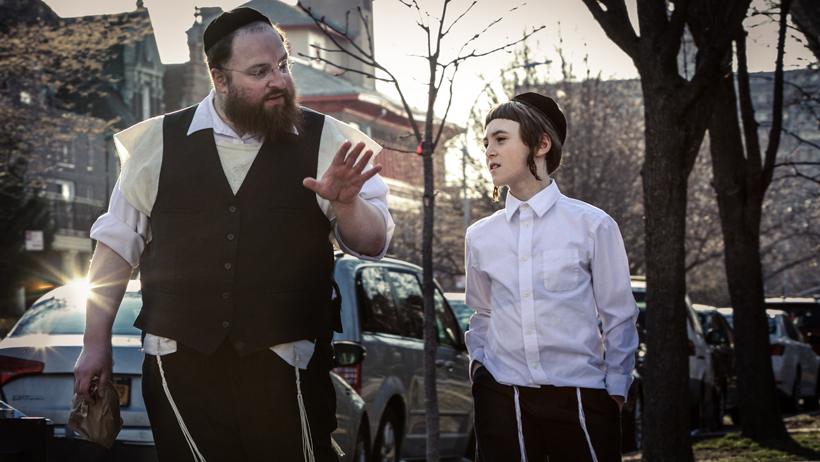If you identify as Jewish but not as strictly observant, taking a drive along Devon Ave. or Pratt Blvd. in Chicago's West Rogers Park neighborhood can be a surreal experience. Do it on a nice Saturday afternoon and you might even start to feel guilty.
To non-Jews, observing the men in black and white with long peiyot (sideburns) and modestly dressed women with sheitels (wigs) who fill the sidewalks of these Orthodox Jewish neighborhoods probably feels like a cultural exhibit; for Jews who feel strongly committed to their Judaism but live more assimilated lives, it can feel kind of tragic to witness people living lives so foreign to you with whom you share a common heritage.
Menashe , a new independent Yiddish-language film, helps shatter that distant, aquarium effect with a touching -- and in many ways groundbreaking -- portrait of a 30-something Hasidic single father in Brooklyn.
You'd expect Menashe to come from filmmakers with a deep, personal knowledge of Hasidism, but director Joshua Z. Weinstein is actually one of those aforementioned Jews living a more assimilated life. He doesn't even speak Yiddish. A documentary short filmmaker by trade, Weinstein spent a lot of time observing ultra-Orthodox communities in New York, and Menashe is his effort to create an insider-like depiction of that lifestyle that was as authentic as possible.
When you think about it, Weinstein's task was a nearly impossible one, and that's what makes Menashe not just a good movie, but something special. Firstly, the film could not be a documentary because the communities would never permit themselves to be filmed. Secondly, he had to find Hasidic actors who would be willing to participate in a project that involved significant contact with the secular world (in some cases risking marginalization by their community) and craft a story that would be true to their experiences.
The film's linchpin is star Menashe Lustig, whose personal story of being a young widower in New York's New Square formed the basis of the script. As is the case in the film, Lustig was told -- in strict adherence to Jewish law -- that he needed to re-marry in order to retain custody of his son. In the film, Menashe barely holds a low-paying grocery store job and butts heads with his stubborn brother-in-law (Yoel Falkowitz) over what's right for his son, in some cases defying the words of the "Ruv," the community's chief rabbi.
An actor with a real gift for comedy and physicality, Lustig is one of those once-in-a-long-while finds -- someone who would never have been discovered otherwise and likely someone whom secular audiences will never witness again. After all, he's Hasidic -- just making this film was undoubtedly a challenge in and of itself for him personally.
Most films about insular communities involve a character who wishes to or attempts to escape it, but because of the level of authenticity Weinstein strives for, Menashe becomes a film about grappling with these rules and these unique hardships within the boundaries of accepting and choosing that lifestyle and level of observance.
Jews of any and all affiliations -- all people who follow a religion in general, really -- can empathize with Menashe questioning Torah and what the Rabbi says and struggling with it. No matter our level of observance, we all have rules, beliefs and expectations imposed upon us (and that we impose upon ourselves), and life often throws us curveballs that force us to reconcile how we feel and what we want with those rules and traditions. Many films paint those rules as antagonistic; Menashe portrays them as obstacles to a more meaningful existence.
In this way, Weinstein really honors the Hasidic experience though the film is clearly intended (for practical reasons) for a secular audience. His documentary instincts result in many lingering portraits of these characters and scenes that create a richness of context rather than a compelling storyline.
This approach sends the message that Weinberg didn't want to appropriate the ultra-Orthodox lifestyle in order to tell a juicy story; he wanted to give it a voice and presence in the greater world. More importantly, he wanted to show that while the traditions, trappings and spirit of Hasidic American Jewry are unique, the challenges they face are more familiar to us than we might imagine.
"Menashe" opens in Chicago in select theaters this Friday, Aug. 11.


.jpg?n=6117)

.jpg)





.jpg)



